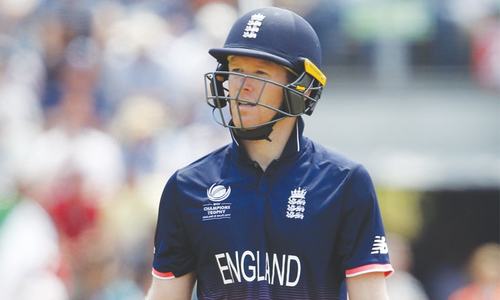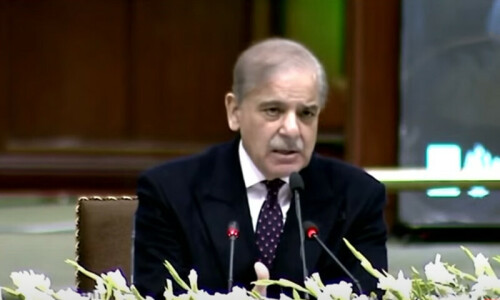“Why is Hafeez still playing for Pakistan?” my cousin messaged, as the Professor propelled Pakistan into a batting collapse against Sri Lanka in Cardiff. Three perfectly-middled and well-timed dot balls with no intentions to score. Followed by a soft dismissal. A solitary run in the space of six typically Hafeez minutes spent at the crease without much purpose.
I try not answering. I have advocated Hafeez’s selection for too many years to get into that conversation. Hafeez is currently ranked as the second best ODI all-rounder in the world.
Yes, Hafeez is a better all-rounder than Ben Stokes, ranked higher than Angelo Mathews and positioned five places above Ravindra Jadeja in ICC’s player rankings.
Current ODI All-Rounders ICC Player Rankings

There has to be something wrong with ICC calculations, and/or something a miss with the Pakistani public, a large part of which does not want Hafeez in the team. The other nine in the top ten all-rounders are heroes in their country. Why is Hafeez then demonised in his?
Is there sound reason to this notion?
My brother responds to my cousin, “We need Hafeez’s bowling. It’s usually very good. He refuses to bat lower. It’s been a problem for a long time. He still wants to open. They moved him to three after many failures, and now to four after failing many times at three. At this rate he will move to number six by 2020.”
I laugh at the truth behind this comment, more though in disgust. Pakistan has made a mess of a modest chase of 236 runs on a pitch devoid of spitting cobras.
I can’t take it anymore. I reply, “You cannot expect bowling all-rounders to bat in the top order”. Pakistan has suffered from the batting all-rounder delusion for so long, and has yet not been able to get its balance right.
Also read: The 'batting' all-rounder delusion
Pakistan is playing with only three specialist batsmen, Azhar, Fakhar, and Babar. Hafeez, Malik, Sarfraz, Imad, Fahim, Amir, Hasan, and Junaid are the other eight players. We need more specialist batsmen I insist.
Why is Haris Sohail sitting out? He averages 52.01 in First Class cricket and 43.00 in ODIs. In comparison, Hafeez averages: 34.91 and 32.69, Malik: 37.09 and 35.35, and Imad: 41.59 and 35.00.
Imad and Hafeez play a similar bowling role with startling economy rates of 4.63 and 4.13 respectively. These numbers in this day and age are like that of Joel Garner’s of its time.
Imad bats low down the order with a strike rate of 100.26. And Hafeez bats with a horrendous modern day strike rate of 75.21 up the order, like he is batting in the time of Joel Garner.
By now, Pakistan is 137-6 with Imad also returning to the pavilion. I have had it. It is not about individuals, I say. Teams are built on combinations and balance. Please play proper batsmen in the top order, and either play Hafeez or Imad for the all-rounder’s slot. I am fuming.
After the next 80 minutes of miracle, Pakistani batting and morbid Sri Lankan fielding, Pakistan crossed the finish line, and went into the semis.
The conversation is halted by celebrations.
“They should play Shahdab, England is suspect against spin, and Shahdab is a wicket taker,” says my father–in–law before the semi-final. But whom would you drop? I ask. Imad, he suggests.
Shadab could be a good option, but dropping Imad would make the frail Pakistani batting line even more fragile, I reason.
The team against England is announced.
Amir is unfit, replaced by debutant Rumman Raees. Shadab is in, replacing Fahim Ashraf.
Fahim? The 23-year-old who kick-started Pakistan’s fight-back against Sri Lanka by hooking Malinga out of the ground? The debutant who took 2/37? Who chased 342 in the warm up game against Bangladesh? After being unlikely run-out on debut and then being dropped in the next game must have hurt the kid.
Well, horses for courses. Pakistan has probably picked their best XI, I thought.
And the best XI, performed at its best – crushing England with an eight-wicket win, in 37.1 overs.
In depth: India to face Pakistan in Champions Trophy final after comfortably beating Bangladesh
Within seconds of Pakistan winning the semi-final, I receive another group message from my other brother. “What a great win, comprehensive! No place for Amir in this XI.” I chuckle, shake my head, and resist to respond.
Amir is still almost always the first bowler the Pakistani captain picks, I say to myself. He is still the man the skipper turns to most on the field.
Amir has bowled 697 overs in the last 12 months, Wahab is number two with 443 overs, and Hasan third with 229 overs. Amir is the only regular bowler across all three formats. He is the first bowler that is picked in the Pakistani team, in any format.
Yet, my brother’s point holds weight. Rumman bowled his heart out on debut and returned with figures of 2/44 in the semi-final win against England. Amir has taken 2/135 in the three games in the tournament.
In Pakistan, we are all selectors. No captain knows how to select a playing XI better than any of us commoners. And the PCB and its selection committee over the years? Biased, corrupt, inept; the lesser said, the better. They have done well to earn a reputation usually reserved for the politicians of the country.
The Pakistani public knows better. It knows how Fawad Alam is the highest averaging (56.51), run-hungry giant on Pakistan’s domestic circuit and averaging 41.66 in Test cricket and 40.25 in ODIs. Ignored by the selectors for so long that his only solace today is the example of Misbah–ul–Haq, who has redefined the cricketing age-cycle in the country. But lets keep that for another day.
Debutants Fahim and Raees have performed well, while Junaid and Hasan (who has a niggle in his shin) seem automatic selections. And Amir should be fit by Sunday. Pakistani captains face many problems. But the difficulty of selecting from a bunch of performing bowlers is perhaps one of the few good problems Sarfraz will ever face.
Amir is likely to return in place of Raees, and Fahim might get the nod ahead of Shahdab considering how well India plays spin.
Expected team for the final: Azhar Ali, Fakhar Zaman, Babar Azam, Mohammad Hafeez, Shaoib Malik, *Sarfraz Ahmed, Imad Wasim, Fahim Ashraf, Mohammad Amir, Hasan Ali and Junaid Khan
















































